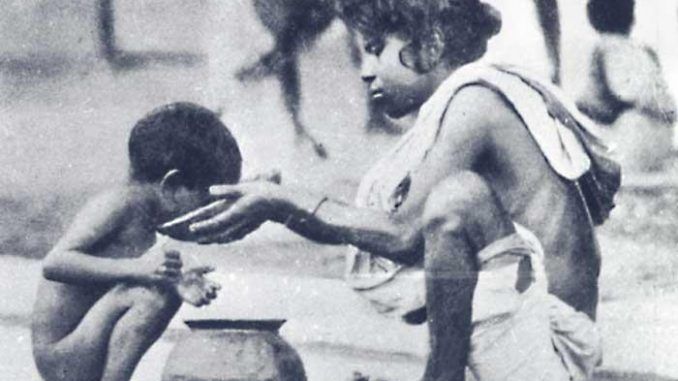
Seventy years ago around 3 million Indian people died from starvation and malnutrition during a famine in Bengal.
An Australian biochemist has referred to the Bengal famine as a man-made “holocaust” with Britain largely to blame.
Ibtimes.com reports:

BYPASS THE CENSORS
Sign up to get unfiltered news delivered straight to your inbox.
You can unsubscribe any time. By subscribing you agree to our Terms of Use
A complex confluence of malign factors led to the catastrophe, which occurred with the world at war, including, as Indian parliamentary member and leading agricultural scientist M. S. Swaminathan cited in the Hindu newspaper, the Japanese occupation of neighboring Burma and damage to the local rice crop due to tidal waves and a fungal disease epidemic.
Swaminathan also blamed “panic purchase and hoarding by the rich, failure of governance, particularly in relation to the equitable distribution of the available food grains, disruption of communication due to World War II and the indifference of the then UK government to the plight of the starving people of undivided Bengal.”
But while famines were not uncommon in India throughout history, largely because of periodic droughts or monsoons, the tragedy in Bengal had the unmistakable hand of man in it, making it an even greater calamity of recent global history.
In the prior year, 1942, when Japan seized Burma, an important rice exporter, the British bought up massive amounts of rice but hoarded it. The famine only ended because Bengal thankfully delivered a strong rice harvest by 1944.
Dr. Gideon Polya, an Australian biochemist, has called the Bengal famine a man-made “holocaust.”
“The British brought an unsympathetic and ruthless economic agenda to India,” he wrote.
Polya further noted that the “loss of rice from Burma and ineffective government controls on hoarding and profiteering led inevitably to enormous price rises. Thus it can be estimated that the price of rice in Dacca (East Bengal) increased about four-fold in the period from March to October 1943. Bengalis having to purchase food (e.g landless laborers) suffered immensely. Thus, it is estimated that about 30 percent of one particular laborer class died in the famine.”
Many observers in both modern India and Great Britain blame Winston Churchill, Britain’s inspiring wartime leader at the time, for the devastation wrought by the famine.
In 2010, Bengali author Madhusree Mukherjee wrote a book about the famine called “Churchill’s Secret War,” in which she explicitly blamed Churchill for worsening the starvation in Bengal by ordering the diversion of food away from Indians and toward British troops around the world.
Mukherjee’s book described how wheat from Australia (which could have been delivered to starving Indians) was instead transported to British troops in the Mediterranean and the Balkans. Even worse, British colonial authorities (again under Churchill’s leadership) actually turned down offers of food from Canada and the U.S.
“If it was someone else other than Churchill, I believe relief would have been sent, and, if it wasn’t for the war, the famine wouldn’t have occurred at all,” Mukherjee told Inter Press Service.
“Churchill’s attitude toward India was quite extreme, and he hated Indians, mainly because he knew India couldn’t be held for very long. One can’t escape the really powerful, racist things that he was saying. It certainly was possible to send relief but for Churchill and the War Cabinet that were hoarding grain for use after the war.”
Churchill’s hostility toward Indians has long been documented. Reportedly, when he first received a telegram from the British colonial authorities in New Delhi about the rising toll of famine deaths in Bengal, his reaction was simply that he regretted that nationalist leader Mahatma Gandhi was not one of the victims.
Later at a War Cabinet meeting, Churchill blamed the Indians themselves for the famine, saying that they “breed like rabbits.”
His attitude toward Indians was made crystal clear when he told Secretary of State for India Leopold Amery: “I hate Indians. They are a beastly people with a beastly religion.”
According to the BBC, Mukherjee said that Cameron should have apologized for the Bengal famine on behalf of his predecessor in Downing Street from decades ago — indeed, even former Prime Minister Tony Blair apologized for Britain’s culpability in the Irish potato famine of the 1840s.
Outside of India, the Bengal famine of 1943 might only be known through the efforts of Indian filmmaker Satyajit Ray, who directed a movie in 1973 called “Ashani Sanket” (“Distant Thunder”), based on a novel by the same name by Bengali author Bibhutibhushan Bandyopadhyay.

Be the first to comment